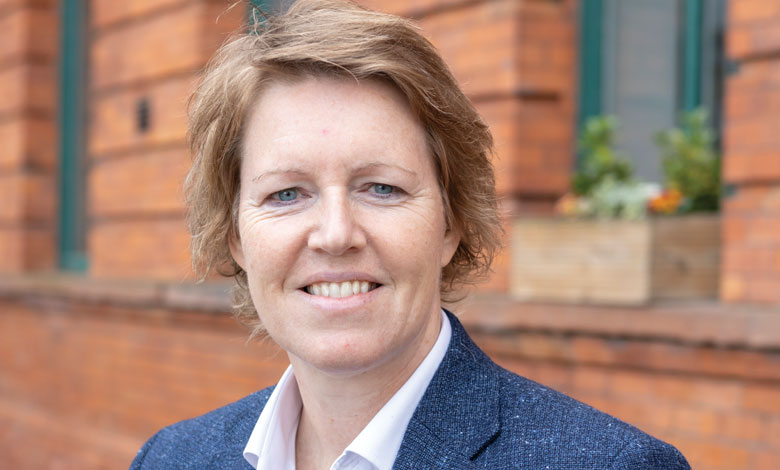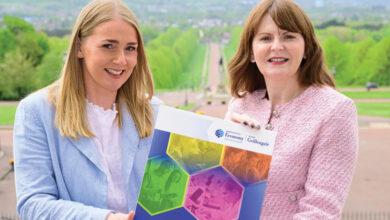Improving productivity through research and development

Investment in research and development is critical to improving Northern Ireland’s productivity and economic outcomes, says the region’s first Chief Scientific and Technology Advisor (CSTA), Helen McCarthy.
Science and technology underpin every one of the priorities outlined in the Northern Ireland Executive’s draft Programme for Government, argues McCarthy, who is chair of Nanomedicine in the School of Pharmacy at Queen’s University Belfast. As CSTA, McCarthy is responsible for coordinating a regional strategy on science and technology across Northern Ireland and representing the region at SAGE or COBRA for civil contingencies.
McCarthy’s role as the region’s CSTA also includes championing technology and innovation, embedding science in policymaking, increasing research and development, and representing Northern Ireland, nationally and globally.
“Science and technology have shown time and time again that research and development, and innovation, does drive sustainable growth,” McCarthy asserts.
“It is my job to challenge the Executive on absolutely everything, but I want to put particular emphasis on developing and improving research and development, because research and development is the ticket that is really going to make the difference in improving Northern Ireland’s productivity and economy.”
McCarthy states that one of her first actions as CSTA was to put a “champion of science” in each of the Executive’s departments, believing that there is “a need for science and technology to deliver on the Northern Ireland-centric objectives which have been deduced in the Programme for Government” adding “but we also need research to support the Programme for Government”.
McCarthy identifies the Northern Ireland-centric objectives as:
• implementing a science and technology strategy;
• research to support Programme for Government;
• creating Northern Ireland Science, a body designed to bring together all the relevant actors in research and development and innovation in the region;
• increasing research and design;
• promoting women in science, technology, engineering, arts and technology (STEAM);
• enhancing deep tech commercialisation and scale; and
• enhancing the Northern Ireland Science and Technology Advisory Network (NISTAN).
Northern Ireland’s research and development deficit
McCarthy cites the 2015 Nurse Review of the UK Research Councils, in which the UK Government accepted the review’s recommendation to provide;
• a more strategic approach to departmental research and development programmes;
• a more sophisticated dialogue with academia; and
• documents that set out the most important research questions facing each department.
The CSTA explains that the review published guidelines which found that the UK Government departments were not aligned with higher education departments.
“It was recognised that there needed to be a greater level of coalition and cohesion and so since 2017, England, Scotland, and Wales have been involved in publishing the areas of research interest for our government departments, but Northern Ireland does not do this,” McCarthy emphasises.
“What that means is all of the departments in Whitehall are publishing what their areas of research are, and are promoting it to all of the education institutions and businesses across the UK, and seeking investment to address their gaps in research and development or innovation. Northern Ireland has not been at the table to do this.”
McCarthy states that another priority when she became CSTA was to ensure Northern Ireland started to set areas of research interest, highlighting: “The idea behind this is to align the research evidence, get access to a wider range of suppliers, engage with researchers so that we have the latest technologies to help solve our problems.
“We want to build a coalition for change in innovation derived enterprises, and some of the projects that the Executive has underway include identifying areas of research interest (ARIs), establishing a real time data framework for research and development, building a coalition for change in IDEs, and establishing Northern Ireland Science.”
Funding lag for research and development
There is no updated data to verify the funding for the region’s research and development. The last time the total research and development spend was recorded was in 2022, where an estimated £1.12 billion was spent on research and development, representing a decrease of 0.7 per cent from 2021.
“This frustrates me to no end,” McCarthy states. “We are nearly in 2025 and there has been no updated figure in three years. Science and technology and any type of innovations that we wish to do cannot be sustained nor work on a three-year lag cycle.
“We simply cannot work this way and it is not possible to evaluate where Northern Ireland is. There is also reason to believe when you look at the amount of flatlines in research and development, that the Executive departments have not ringfenced money for internal research and development spend for many years.”
McCarthy explains that both Ulster University and Queen’s University Belfast told her that the data which appeared to have flatlined in 2022, will have gone up in 2024, but McCarthy says: “I cannot show that data because it has not and cannot be verified. Up to date data is imperative in affirming these claims.”
Creating Northern Ireland Science
One of McCarthy’s key outstanding priorities in her role as the CSTA for the region, is to create and develop a home for Northern Ireland Science (NIS), a body which will bring together and house all of the various research and development, and innovation sectors under one roof. It will not change any of the independent bodies that operate in Northern Ireland, but it will bring them together “so that we can share collaborations and expertise, and also simple things like equipment”.
“Bodies like Go Science UK and Scottish Science already exist, but we do not have something like this in Northern Ireland,” McCarthy says. “If we have someone external who wants to know what sectors Northern Ireland excels in, how it can contribute to innovation and research and development, there is no body that can showcase the identifiable areas of excellence this place has to offer.
“NIS would allow us to enhance collaboration, reduce duplication and make it easier for stakeholders to invest and access the opportunities Northern Ireland has to offer. There is a lot we can do, but the reality is, the Executive needs help with all the things we want to achieve in research and development.”





